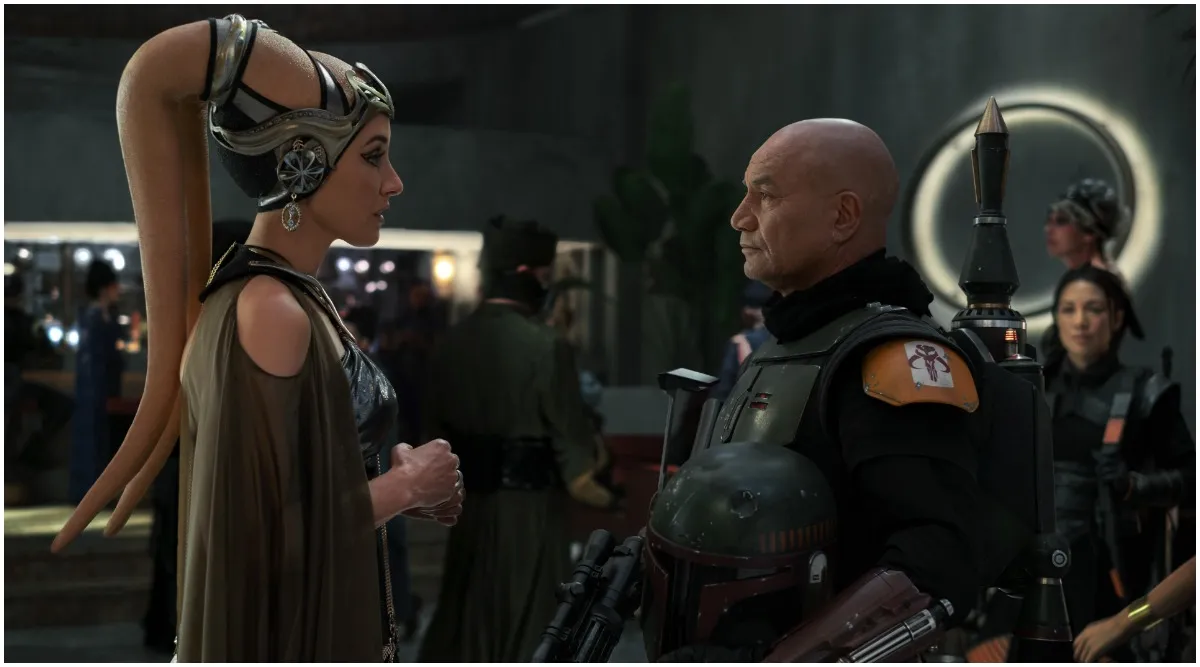 A still from The Book of Boba Fett Chapter 2: The Tribes of Tatooine. (Photo: Disney+)
A still from The Book of Boba Fett Chapter 2: The Tribes of Tatooine. (Photo: Disney+) The Book of Boba Fett, Chapter 1: The Tribes of Tatooine
Director – Steph Green
Cast – Temuera Morrison, Ming-Na Wen, Jennifer Beals
Rating – 3/5
After a 15 minute sequence that captures Boba Fett’s continued struggles to establish himself as the Big Cheese in Mos Espa, the second episode of The Book of Boba Fett proceeds to unfurl an extended flashback that would’ve been long even if the episode itself had been of a more conventional length. But Chapter Two, titled The Tribes of Tatooine, runs for over 50 minutes–almost twice the length of the usual live-action Star Wars episode–which means that the flashback sequence goes on for over half-an-hour.
Presented with this information, it would be perfectly reasonable of you to wonder if the ‘present day’ sections in The Book of Boba Fett are, in fact, flash-forwards.
By now, after two episodes, it is clear that series creator Jon Favreau is following a pattern here. After the requisite ‘A Day in the Life of Boba Fett’ sequence, you can safely expect the narrative to busy itself in uncovering the bounty hunter’s past. This would be a fine strategy, provided there had been much to mine there, but The Book of Boba Fett has zeroed in on perhaps the least interesting phase in the enigmatic character’s life.
There’s nothing in here about his youth, or his early days as a bounty hunter in the employ of Darth Vader. More surprisingly, there has barely been a mention of his father, Jango Fett. The show seems to be primarily concerned with the events immediately following his escape from the Sarlacc Pit, which, somewhat disappointingly, are restricted to him trying to assimilate into Tusken culture. The Book of Boba Fett is building towards something, and it had better get to the point soon.
Having been taken prisoner by a group of Tusken Raiders in episode one, Boba Fett proves his worth by helping them rob a train. After that underwhelming season premiere, episode two feels like more familiar territory. Director Steph Green stages the Great Train Robbery with confidence, and with a style that honours Westerns of yore.
And unlike director Robert Rodriguez’s season opener, The Tribes of Tatooine is more in line with the visual language that Favreau helped establish over on The Mandalorian, which is where Boba Fett was reintroduced in a season two backdoor pilot. It is more sweeping in scope, and less frenetically edited, which gives you time to admire the immaculate StageCraft technology.
But here’s the problem: train robbery sequences are such a cornerstone of Western cinema, not only has this trope been (repeatedly) done before in the Star Wars universe, it has been done better. Similar sequences in Solo: A Star Wars Story and director Rick Famuyiwa’s season two episode of The Mandalorian were far superior. Because they had real stakes.
The Tribes of Tatooine cements The Book of Boba Fett’s now-worrying identity as a show about nothing. And unlike Seinfeld, this can’t be mistaken as a compliment here.
Episode two, like episode one, devotes far too much time to moments of inactivity (which I am sure it believes is adding colour to the largely bland story), and peppers its largely wordless script with throwaway lines that’ll make even fans of the Star Wars series go, “Huh.”
“These are not the death pits of Duur and I am not a sleeping Trandoshan guard,” Boba Fett says at one point, which is meant to be… funny? And then there’s the sequence in which the bounty hunter teaches a bunch of dimwit Tusken Raiders how to ride speeder bikes. It would have worked so much better if the show had even a slight sense of playfulness. Instead, for some reason, Favreau and co. have given the ominously-titled The Book of Boba Fett a depressingly dour tone. And there has been no thematic evidence so far to warrant this level of seriousness.
With just five episodes to go, The Book of Boba Fett lacks urgency, a villain, and any real forward momentum. It is a bloated, $200 million equivalent of something that makes you want to say, “This could have been an email.”
- The Indian Express website has been rated GREEN for its credibility and trustworthiness by Newsguard, a global service that rates news sources for their journalistic standards.



